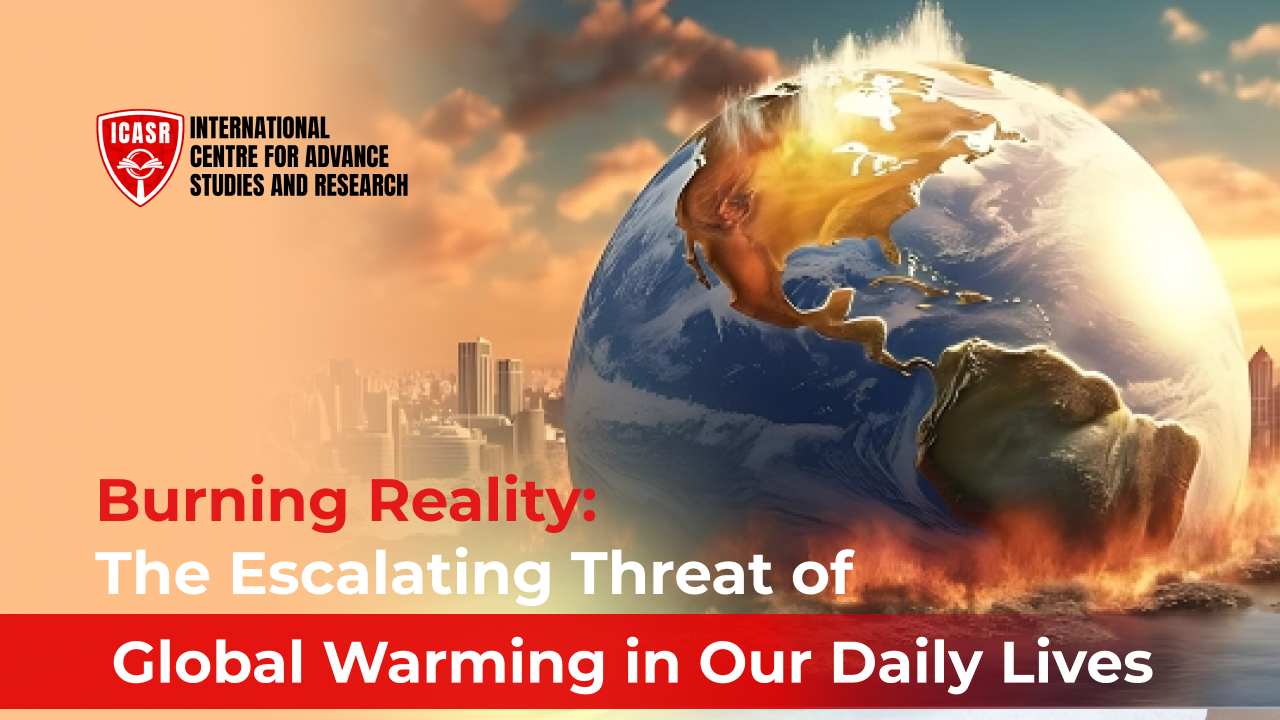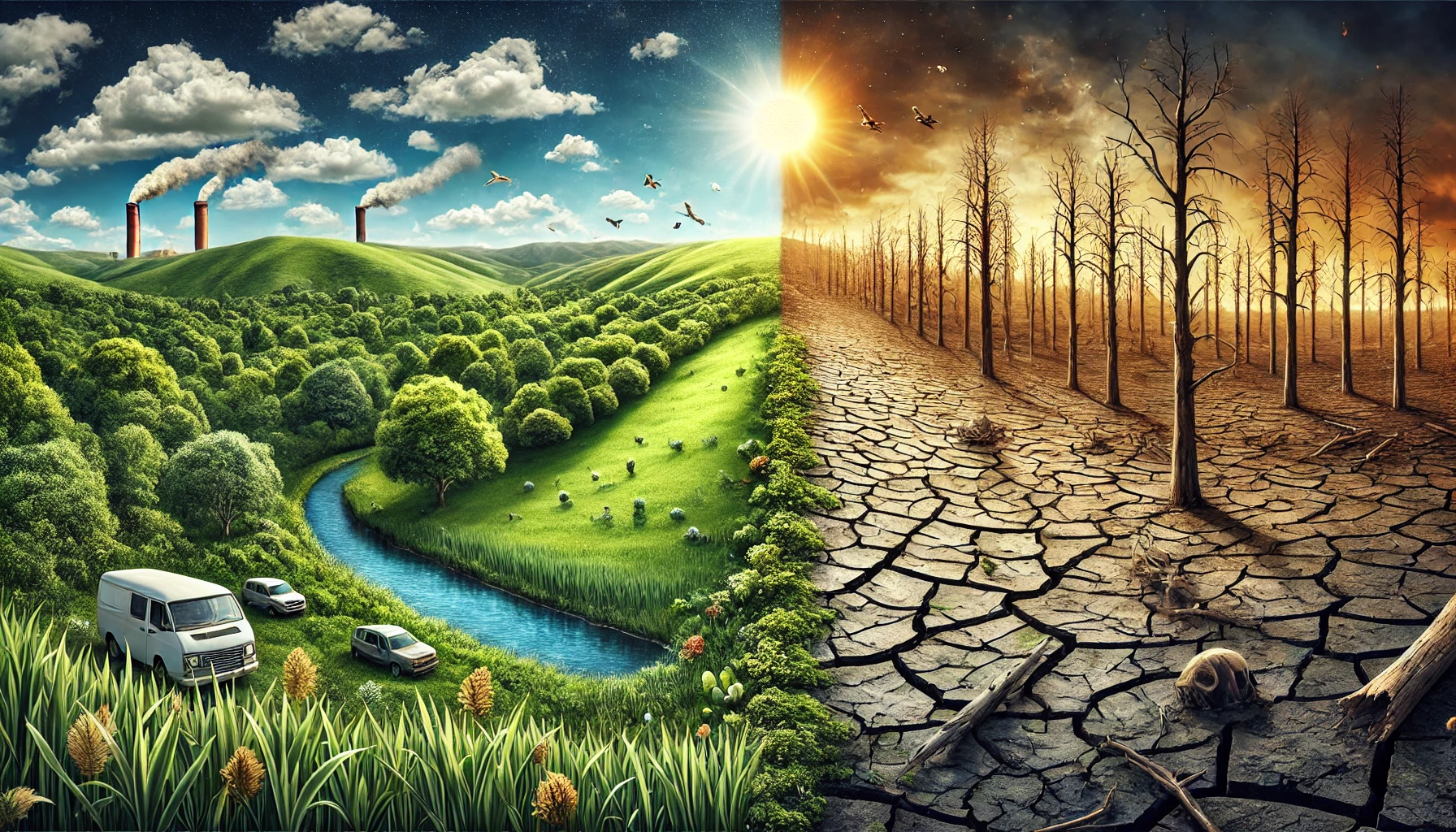Global warming, though once viewed as a distant problem, is now an undeniable reality knocking on our doors. It has ceased to be a subject of scientific papers and remote icebergs only. It is something everyone feels daily, from harsh weather conditions to rising sea levels to anything else you may imagine.
In 2021, the IPCC's Sicth Assessment report indicated that since 1850-1900 human activities have increased the worldwide temperature by nearly 2 degrees Fahrenheit (1.1 degrees Celsius) by discharging gases that hold heat.1 GLobal average temperatures and projected to surpass 1.5 degrees Celsius by mid-century or at some point thereafter. Consequently, this will have an impact on every part of the planet.
Understanding the Threat:
The atmosphere balance of the Earth that suspends the delicate balance of its climate is being disrupted by global warming caused essentially by the excessive production of greenhouse gases. Carbon dioxide and methane gases are usually responsible for trapping the sun's heat leading to a gradual increase in temperature worldwide. As innocent as it may appear at first glance, this has serious long-term consequences for both people on Earth and other living things.
Worldwide we are starting to feel the impacts of what is already in front of us in terms of global warming. Inundation of coastal cities with rising sea levels is happening while there are more and more frequent and severe extreme weather events like hurricanes, droughts, and floods. These events not only cause immense destruction but also make people lose their source of livelihood displace communities and stretch economic resources.
Additionally, biodiversity is experiencing an impact on what is already resulting from global warming. This habitat destruction cascades throughout the ecosystem including human beings and food chains in some unfathomable ways.
The Impact on Our Daily Lives:
The outcomes of global warming are not limited to faraway places to future offspring, it is affecting us daily in several ways. For example, hot temperatures have caused an increase in the number of hot days which in turn presents heat wave episodes that are perilous to certain groups within the population. Changes that take place concerning rainfall distribution influence farming practices hence leading to earthy setbacks like crop loss and lack of enough food supplies.
Challenges have also plagued economic sectors. The tourism industry is at risk from unpredictable weather conditions, and the insurance sector has been overwhelmed by rising claims from disasters of nature giving rise to the impacts that spill over employment patterns as well as general economic stability.
Concrete Examples of Global Warming's Impact:
To get the seriousness of global warming, let's look at some practical examples of how it affects us every day.
Extreme Weather Events:
Climate change has increased the frequency and intensity of extreme weather events. From rare instances, heatwaves have evolved into more frequent fatal occurrences. This is evident in North America and Europe where thousands of people died as a result of high temperatures in 2021, Hurricanes, typhoons and cyclones intensified at the other end of the spectrum thus causing widespread devastation accompanied by economic loss. Hurricane Katrina in 2005 was characterized by the worst damage ever caused by these kinds of storms.
Rising Sea Level:
Glaciers and polar ice caps are rapidly melting and as a result sea levels are increasing because of this coastal cities are at risk from flooding that can lead to inundation while tiny island states have even less time left before they disappear completely. Saltwater water is infiltrating freshwater sources along coastlines in a number of locations, making it impossible for farmers to grow their products or use them for other purposes such as cooking and drinking.
Food security:
The way climate change affects crop yield will result in malnutrition since there are no rains and sustained growth. This means that the more severe weather patterns are experienced, the more serious the impact on food security. Temperature increases the risk of harvests more than any other factor affecting agricultural lifestyle.
Economic Impact:
Global warming has far-reaching effects and causes considerable financial consequences. This is because there has been greater frequency in natural disasters; hence higher risks in the insurance sector. This could be a drop in tourism attraction due to changes in weather caused by global warming also leading to a decrease in profits for those who depend upon this line of business.
Health Risks:
Climate change stands as an increasing threat to human health. For instance, heatwaves- which result in heatstroke among others- are killer weather events. How the spread of infectious diseases is influenced by climate factors cannot be over-emphasized. One such way is when a warmer environment becomes conducive for mosquitoes to breed hence raising chances of contracting diseases such as malaria and dengue fever.
The Urgent Need for Action:
For global warming's extreme effects to be reduced, critical and combined efforts are needed by all. It is necessary to improve the environmental conservation. Sustainability includes reducing waste, adopting sustainable practices, conserving energy and supporting organizations doing environmental protection work.
Another essential step is getting rid of fossil fuels. Using environmentally friendly forms of energy like wind, water and sunlight is necessary for the sustainability of our planet. For this shift to happen faster governments, businesses and people must work together.
It is also important to invest in research and development of clean technologies. This will help in coming up with innovative and more effective methods that will help in reducing emissions. Investing in research and development for clean technologies is crucial for finding innovative solutions.
Supporting environmental preservation is as crucial as well. Forests are carbon sinks while sustainable agricultural practices can reduce climate change. People should also adopt green practices like using less energy. recycle, and not use cars for transport.
Be reminded that minor activities matter a lot since they can create massive changes. As for emissions reduction, resource conservation and change advocacy, we contribute towards tomorrow's sustainability. It is time for us now to take action. We should take up the challenge and stand side by side in safeguarding the environment. Ultimately, global warming is everyone' problem. Looking ahead, sustainability lies in a joint effort among governments, businesses and individual members of society.


